Swapping and saving seeds: Preparing for the 2023 growing season
| Published: 02-27-2023 6:26 PM |
Melinda McCreven’s family maintained a small garden behind their West Haven, Connecticut home, but she wasn’t very interested in gardening as a child; later, though, McCreven developed a passion for all things horticulture. Local residents have benefited from her enthusiasm over the years, and can do so again on Sunday, March 19, when McCreven presents the 16th annual Cabin Fever Seed Swap from 1 to 4 p.m. at Just Roots, the community farming site in north Greenfield.
People can “drop by any time, and don’t worry if you don’t have seeds to swap,” said McCreven. “We’ll have plenty!”
Available seeds will include donations from High Mowing in Vermont, as well as the Greenfield Farmers Cooperative Exchange. “The folks at the Farmers Exchange especially love it when seeds make it into the hands of kids and teachers,” said McCreven.
The seeds available at the swap are mostly from last year, “but that’s fine,” McCreven added. “Of course, freshest seeds have the greatest germination rate, but year-old seeds do OK. You just have to plant more thickly.”
Upon moving to Greenfield in 2005, McCreven was thrilled to have gardening space at her new home, and shared the news with her grandmother, Dorothy Hackett. “You’ve got Elford in you!” replied Hackett. Elford Lounsbury, Hackett’s father and McCreven’s great-grandfather, farmed for decades in rural Connecticut. “He never owned a farm,” said McCreven, “but he worked on other people’s farms.”
McCreven’s agricultural roots run deep, figuratively and literally. One lifelong interest sprang from visits to her grandmother’s place: “She had a willow tree I loved,” said McCreven, “and I love the story behind the tree, too.” Her grandmother’s neighbor had a willow that was damaged during a hurricane, and the neighbor gave Hackett a stick from part of the tree that came down in the storm, telling her to simply put it in the ground and watch it grow. Hackett was dubious about the plan, but followed her neighbor’s suggestion and found that, indeed, the stick grew into a majestic tree.
A plant hormone that stimulates root growth — indolebutyric acid (IBA) — is present in high concentrations in willows. If you cut actively growing willow branches and soak them in water, it will result in significant quantities of IBA leaching into the water.
“I grew up knowing that weeping willow intimately,” said McCreven, “and in time learned about the many things willows can be used to create, including wreaths, baskets and caskets.” Willow branches and lumber also can be used to make chairs, mats, baskets, boxes, brooms, cradle boards, cricket bats, flutes, toys, wand, whistles and many other items. “I grow lots of different varieties of willow around Greenfield,” said McCreven. “I’m interested in how things were done before the manufacturing era, when people were more self-sustaining.”
Article continues after...
Yesterday's Most Read Articles
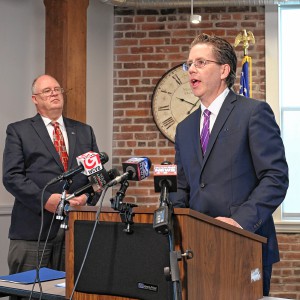 1989 homicide victim found in Warwick ID’d through genetic testing, but some mysteries remain
1989 homicide victim found in Warwick ID’d through genetic testing, but some mysteries remain
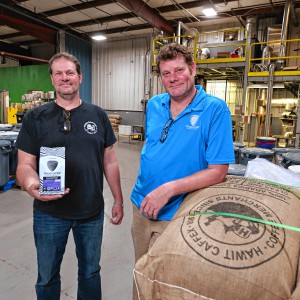 Fogbuster Coffee Works, formerly Pierce Brothers, celebrating 30 years in business
Fogbuster Coffee Works, formerly Pierce Brothers, celebrating 30 years in business
 Greenfield homicide victim to be memorialized in Pittsfield
Greenfield homicide victim to be memorialized in Pittsfield
 Real Estate Transactions: May 3, 2024
Real Estate Transactions: May 3, 2024
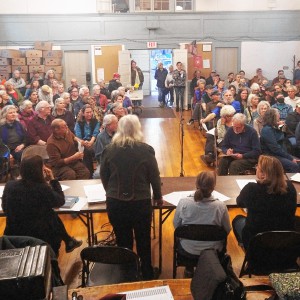 Battery storage bylaw passes in Wendell
Battery storage bylaw passes in Wendell
 As I See It: Between Israel and Palestine: Which side should we be on, and why?
As I See It: Between Israel and Palestine: Which side should we be on, and why?
That interest led McCreven to permaculture practices, an approach to land management and design that adopts arrangements observed in flourishing natural ecosystems. Permaculture is typified by whole-systems thinking, and applies these principles in fields such as regenerative agriculture, “rewilding” and community resilience.
Learning about permaculture inspired McCreven to host seed swaps, and she brings her green thumb to many other parts of her life, as well. In addition to being a skilled gardener-for-hire, she’s a mental health professional who incorporates horticulture into healing practices. McCreven’s skills and expertise now extend far beyond willow-related crafts, and she shares her knowledge with community members.
The seed swaps and related events McCreven helps organize are natural extensions of the gifts she brings to clients. A visual artist, McCreven earned a master’s degree in clinical mental health counseling and expressive art therapy from Lesley University in Cambridge. “When working at nursing homes, I often include horticultural aspects,” said McCreven, who thoroughly enjoys working with elders.
Her interest in seed swaps and plant sharing are also born of her love of people and community building. “The connections go way beyond seeds,” she said. “It’s great to see people come together and share ideas and encouragement.” McCreven loves overhearing growers share information about micro-climates: “Someone from the hilltowns can have a very different experience from a valley dweller.”
The seed swap events initially took place at Green Fields Market on Greenfield’s Main Street, but the event outgrew that second-floor community space. “Just Roots is perfect for our purposes,” McCreven said, “and I’m grateful to Meryl [LaTronica, director of farm operations] for making it possible. At Just Roots, we have tables and tents, and plenty of parking.”
McCreven enthusiastically credits Gill farmer Daniel Botkin for his support over many years. “Danny is a treasure in this community,” she said. “He’s amazingly generous with his time and expertise. I’ve learned a ton from him. Danny’s especially knowledgeable about seed saving.”
Seed saving is the practice of retaining seeds or other reproductive materials, which can include tubers, from vegetables, grain, herbs and flowers to be used for subsequent plantings, which is how most farms and gardens operated for thousands of years. In the latter part of the 20th century, however, the practice declined as growers purchased seeds annually from commercial operations. Farmers like Botkin are instrumental in renewing the traditional practice. And while his farm and farming activities are currently on hiatus due to an ongoing health challenge, Botkin plans to be at the March 19 event to share the wisdom he’s gained from decades of growing and cultivating.
Botkin’s ardor relates as much to emotional and spiritual health as it does to agricultural production. “My vision is that everyone can be a farmer,” he said. “I’ve found an enormous healing effect from growing and saving seeds and nurturing plants (and animals) on our little farm, and in freely sharing that bounty with others. I suspect these practices could help millions of people afflicted with the stress, angst, sadness and anger of living through climate calamity, endemic violence, political instability and racial tensions.”
Botkin’s fascination with seeds and seed saving are born of two lifelong passions: “free stuff and great food.” He sees the practice of seed saving — including and especially heirloom seeds — as “now even more compelling, as it holds hope for a hungry planet. If we as global citizens want to safeguard our very survival, the real task is to decentralize society’s entire relationship to agriculture, seeds, food production and food security.” Botkin proposes harnessing more native and renewable resources, as well as practicing, building and teaching a locally based, ecologically appropriate and self-sustaining agriculture that is “based not solely on mass production and bottom line, but upon sustainable local economies, soil health and other enduring realities.”
He believes that “the seeds of planet Earth belong to humanity, not to huge corporations. But seed saving is like democracy: it’s a right in name only, unless and until citizens individually and collectively take it upon [ourselves] through participation, collaboration and enduring commitment.” Seed saving is key to food security here in Franklin County and across the planet, he added.
McCreven noted that the pandemic greatly increased people’s interest in growing food at home. “Gardening is a great hobby, one that gets you outside,” she said. “It’s no surprise that seed companies were flooded with orders, and it became difficult to obtain certain types of seeds. It’s a reminder about why it’s great to do it locally.”
As she continues to grow plants both at home and on the Just Roots community farm, McCreven leans toward organic growing, but “welcomes conversations related to quality.” She cultivates with an eye toward sharing with the elders she loves and respects. “I grow flowers in a 75-foot bed, right alongside a greenhouse at Just Roots,” she said. “The flowers are grown mostly from seeds I’ve saved, and I love bringing bouquets to nursing homes in Greenfield.”
McCreven also enjoys the fact that the seed swap event on March 19 — and another one coming up sometime in April at Green Fields Market — will no doubt include other offerings, as often happens at these celebrations. “People bring seedlings, cuttings, garden supplies, books, compost … really anything garden or farm related. People have even brought scions!” A scion is a piece of material from a fruit tree that a grower can use for grafting.
So whether you’re looking for materials to help you get started, or just want to hang out with other growers, the 16th annual Cabin Fever Seed Swap is the place to be!
Eveline MacDougall is the author of “Fiery Hope” and a gardener, musician, artist and mom. To contact: eveline@amandlachorus.org.

 Speaking of Nature: Indulging in eye candy: Finally, after such a long wait, it’s beginning to look like spring is here
Speaking of Nature: Indulging in eye candy: Finally, after such a long wait, it’s beginning to look like spring is here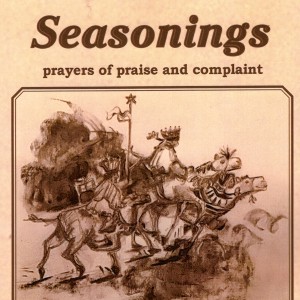 Celebrating ‘Seasonings’: New book by veteran preacher and poet, Allen ‘Mick’ Comstock
Celebrating ‘Seasonings’: New book by veteran preacher and poet, Allen ‘Mick’ Comstock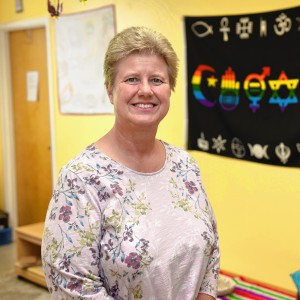 Faith Matters: How to still the muddy waters of overthinking: Clarity, peace and God can be found in the quiet spaces
Faith Matters: How to still the muddy waters of overthinking: Clarity, peace and God can be found in the quiet spaces A time for every purpose under heaven: Free sing-a-long Pete Seeger Fest returns to Ashfield, April 6
A time for every purpose under heaven: Free sing-a-long Pete Seeger Fest returns to Ashfield, April 6
